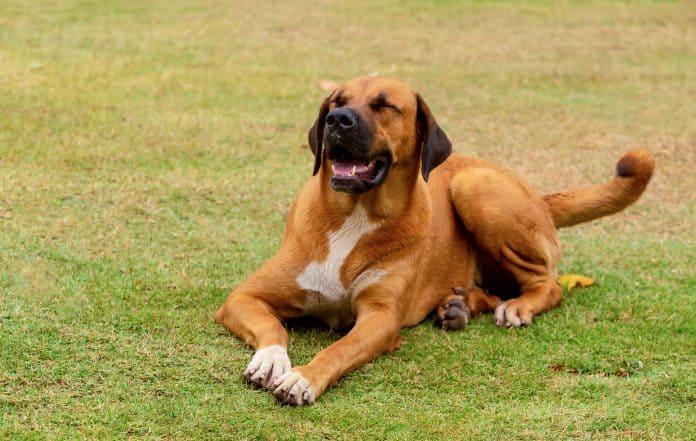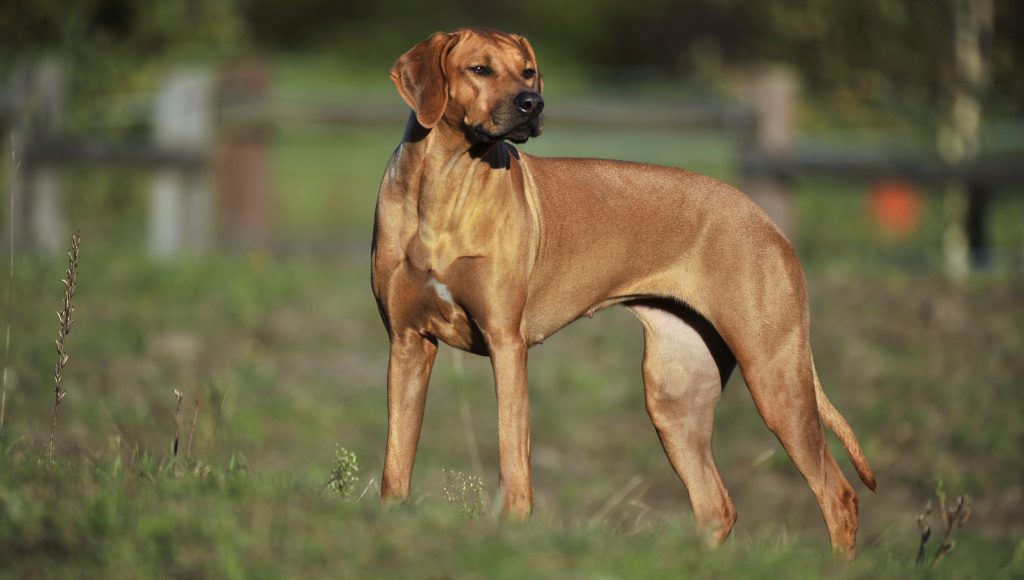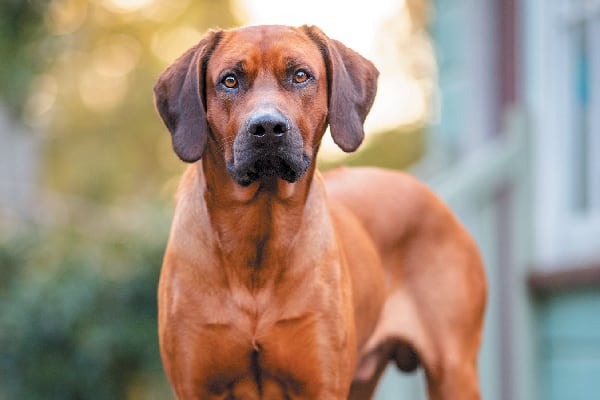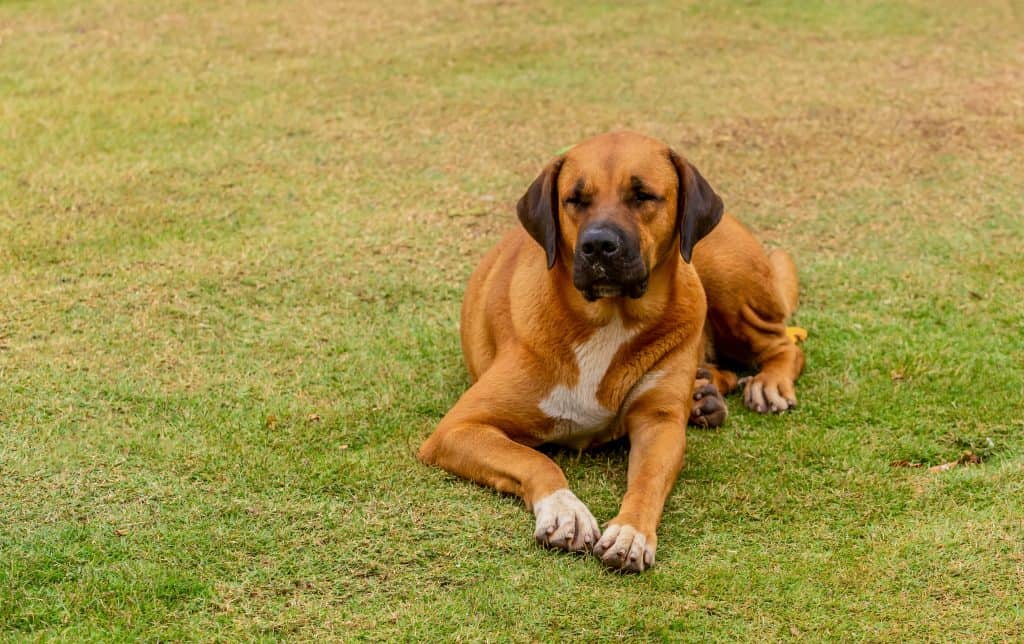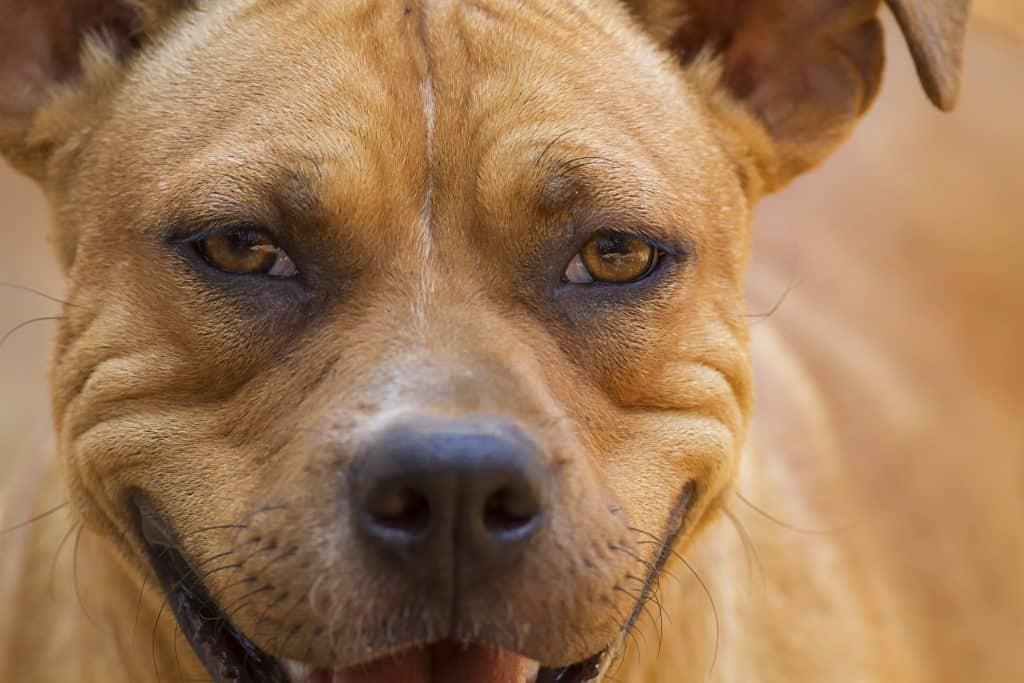Also called Africa’s Lion Dog, the Rhodesian Ridgeback dog is famed for the unique stripe of backward-growing hair on its back.
This breed comes from all the way from Africa and is well-known for its ability to tracking and snarling at lions.
The Lion Dog is highly active, heavy and loyal. It is perfect for a highly active family.
They are an excellent combination of speed, power, and endurance. They are reserved towards strangers and they can be aggressive towards small dogs and other animals.
Rhodesian Ridgebacks form very strong bonds with their masters; however, they can be a tad bit obstinate at times.
Table of Contents
Rhodesian Ridgeback Pictures
Rhodesian Ridgeback Facts

Avg. Weight: 36-41 kgs (Male), 29-34 kgs (Female)
Avg. Height: 63-69 cm (Male), 61-66cm (Female)
Life Expectancy: 10 – 12 years
Dog Group: Hound
Colors: Red Wheaten, Wheaten, Light Wheaten
At A Glance
- Size (4/5)
Slightly longer than tall, the Rhodesian Ridgeback size is moderately huge.
They have the athletic built strong enough to fight lions and other large game too.
The average Rhodesian Ridgeback weight for males is 36-41 kgs and females is 29-34 kgs.
And the average Rhodesian Ridgeback height is 63-69 cms for males and 61-66 cms for females.
- Affection Level (5/5)
Rhodesian Ridgebacks are very affectionate. They are a treasure trove of love.
They might be huge in size but they do not refrain from becoming boisterous at times, especially while playing with children.
This breed is very protective of its family.
- Apartment Friendly (1/5)
Lion Dogs are not suited for apartment living.
However, if you will be able to give your dog the daily physical activity that it needs, he may get accustomed to living in the small spaces.
Rhodesian Ridgebacks are inactive indoors, they adapt best to houses with big yards.
- Cold Weather Tolerability (3/5)
The short coat of this breed provides very little protection against cold weather.
They will be able to sustain themselves to a certain degree but cannot in extremely cold temperatures.
- Hot Weather Tolerability (3/5)
The short coat serves a great advantage to the Rhodesian Ridgebacks in hot weather.
It keeps them breezy and they come from Africa, which is a hot country, so they can live in hot weather.
- Barking Tendencies (1/5)
The Rhodesian Ridgeback is not a talker, which makes it easier if you’re living in an apartment.
They do not bark unless they sense threat or are very excited.
- Cat-Friendly (3/5)
Rhodesian Ridgebacks are very friendly towards cats, they love to play with them.
Even though they have a high prey drive because they have a hunting nature, they do not refrain from playing or petting these furry cats. They quite like them.
- Dog-Friendly (4/5)
They can be dominant around other dogs, especially if they are of the same sex.
They get along with the dogs they have grown up with.
- Exercise Needs (5/5)
Rhodesian Ridgebacks need a lot of exercises.
They need a minimum of two hours of exercise daily which could include short walks and preferably, running.
They love to play fetch and they make great jogging partners too.
- Grooming Needs (1/5)
The Rhodesian Ridgeback has very low grooming needs.
Their small coat is very easy to manage, you can brush it twice a week.
- Playfulness (5/5)
This breed is very playful.
Be prepared for some high jumping from here to there, especially when you have a Rhodesian Ridgeback puppy.
- Trainability (2/5)
You might have a hard time training your Ridgeback. They are sharp but also very stubborn and can often work against your commands.
- Intelligence (4/5)
Rhodesian Ridgebacks are quick to learn and smart. They are a combination of scent hound and sighthounds.
- Mouthiness (1/5)
Ridgebacks do not tend to drool or slobber.
However, they are ones to keep themselves engaged by chewing and destroying things around when bored.
Make sure you take your dog out for walks daily as lack of enough physical activity can drive them to this.
- Price Group (3/5)
The Rhodesian Ridgeback price lies fairly between $700-$2000.
This also varies from breeder to breeder, the linage and other factors.
Show quality dogs definitely are priced on the higher side.
About Rhodesian Ridgeback
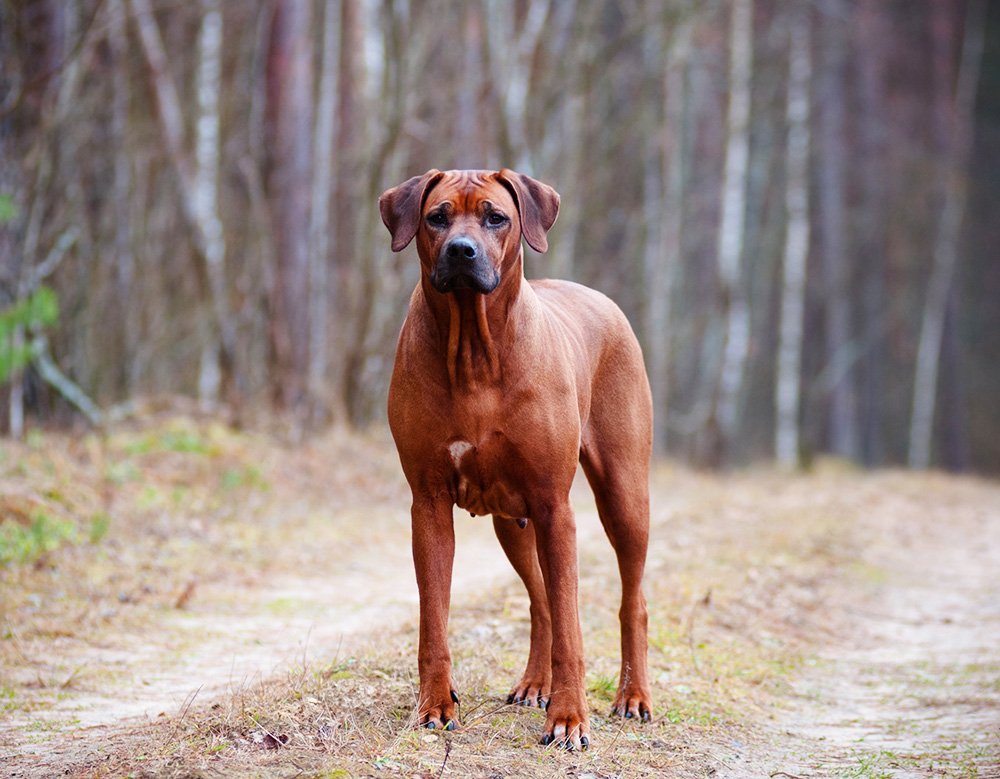
The hallmark of this breed is the backward-growing ridge on the back.
It is opposite in growth to the rest of the coat and it starts just below the shoulders and goes down to the hips.
The Rhodesian Ridgeback dog has may admirers for its characteristics.
Generally associated with hounds but it is a little tougher than the typical hound breed.
They were bred to be hunters and family dogs, so naturally, they are very possessive and protective of their family members.
The Rhodesian Ridgeback temperament is calm, gentle and the plus side is it barely barks.
They are easy keepers; they do not need any extra grooming treatment.
They are tolerant and get along best with children.
They need a high amount of vigorous exercise daily.
If you’re a novice owner considering a Rhodesian Ridgeback, this may not be the breed for you.
Where Rhodesian Ridgeback Came From?
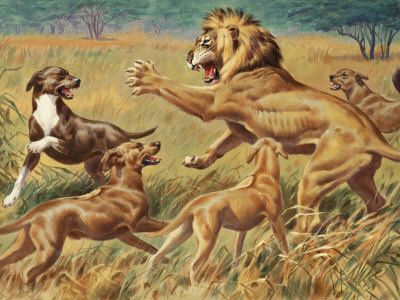
The Ridgeback is also known as the African Lion Hound or the Lion Dog.
It is a native of South Africa. The breed’s history goes back all the way to the 16th century when the Europeans explored the Cape of Good up.
Residing there were the Hottentot Tribes who lived with a dog with hair growing backward on the spine.
This is now called the “ridge”.
The Rhodesian Ridgeback was bred to meet the needs of the Boer farmers; they required a hunting dog in the wilds of Africa.
They needed dogs that could flush game, take down animals at night.
The Rhodesian Ridgeback can also withstand the rigors of the African bush and adapt to the drastic changes in the temperature and the heat.
This dog also had to be the protector of the wife and children.
In 1922, a group of breeders in Zimbabwe set up a standard for this breed that is unchanged to this day.
They were recognized by the American Kennel Club in 1955.
Size

The Rhodesian Ridgeback is a strong, muscular dog with an athletic built.
This breed has great endurance and is very agile.
Male Ridgebacks stand about 60-70 cms tall weighing 40 kgs and females stand 60-50 cms weighing 32 kgs.
The Rhodesian Ridgeback colors are very limited. They are all wheaten, ranging from whiteish wheaten to red wheaten.
They are sleek and glossy in appearance.
They have some white patches on the chest and toes, but it is prominent on the stomach and above the toes.
They have two colors of the noses, black and the rarely seen, brown.
Trainability

The Rhodesian Ridgeback is a perfect family dog.
It will smother you with cuddles and kisses yes, but to answer your question “Are Rhodesian Ridgebacks easy to train?”, no they are not.
However, even though they have a mind of their own, they are highly trainable.
They respond well to positive reinforcement. You have to be extremely patient with your Ridgeback as he may take some time to listen to you.
If you are a novice owner, getting a Ridgeback may bot be the smartest of choices as they need a stern and experienced owner.
You should remember that the Rhodesian Ridgeback is an absorbent sponge when it comes to learning new things.
But if they are not responding to your teaching, it is perhaps because you are confusing them.
Keep your instructions simple and to the point. Use minimal words, that are easy to understand.
Be firm and succinct. And be patient, if you tend to get frustrated or curt this could negatively affect the training.
To read about Dog Obedience Training, click here.
Grooming

Rhodesian Ridgebacks have a short soft coat that does not need too much care.
You should brush it every week to avoid matting. It is suggested to get a full-body clean up every 4 to 8 weeks.
Ensure that the nails are clipped, the anal glands are clean and the skin and coat are in a healthy condition.
Their eyes should be clean, check for any foreign material and wash it with an eyewash.
Check for any problems in the ears, clean only till where you can see. Call the vet if you see anything unusual.
While bathing your Ridgeback, make sure you use a hypoallergenic shampoo if your dog has allergies or sensitive skin with a medicated shampoo to follow it. Condition after the bath to maintain the soft coat.
Use hydrating sprays to keep the coats shiny and moist; to avoid flaking of skin. Rhodesian Ridgeback shedding is chronic but it is not worrisome.
Common Diseases

TARGETING THE BONES
Hip and Elbow Dysplasia
This deformity in the hip or elbow joint could be a result of factors such as genetics, environment, diet etcetera.
This condition is heritable. This could affect daily life; movement may be painful for the Ridgeback.
This could be treated with some medication or in severe cases, surgery might be required.
Ridgebacks now in most countries are X-rayed for hip dysplasia before breeding.
This is an uncommon but debilitating condition.
Elbow and Shoulder disease
This is a very common disease in the Ridgebacks.
They are prone to elbow dysplasia due to which they are also diagnosed with elbow disease.
TARGETING THE SKIN
Dermoid Sinus
This condition is also known as “pilonidal sinus”. It is a tubular skin defect caused by incomplete separation of the skin and the nervous system during embryonic development.
The sinus can be located anywhere between the back or neck bit most commonly affects the neck or upper spine.
This is most common among Rhodesian Ridgebacks; it is heritable and congenital. It is advised the diagnosed pets should not be bred.
TARGETING THE EYES
Cataract
This is less common in dogs and cats than humans, but occur frequently and could lead to blindness.
Cataract formation is the covering of the pupil with a grey almost whiteish layer, it causes opacification of the eye.
A completely opaque eye could result in blindness.
Glaucoma
Glaucoma is the increased pressure in the eye.
It is found in two forms – primary and secondary.
Primary glaucoma is hereditary, secondary glaucoma is caused by decreased liquid in the eyes due to other probable diseases.
Symptoms of glaucoma are loss of sight and pain, treatment and prognosis but they vary depending upon the type.
Glaucoma is treated surgically or with eye drops.
Entropion
This condition persists when the eyelid is rolled inwards in both eyes.
Usually occurs within a year of birth.
This disease causes loss of vision and irritation.
Surgery can be performed when the dog reached adulthood.
TARGETING THE BODY
Gastric Tension
This is a life-threatening situation that can affect large and deep-chested dogs like Rhodesian Ridgebacks.
This could arise if they are fed large meals or they eat rapidly or they drink too much water after eating. This condition also called “bloat”, is common among other dogs.
It occurs when the stomach is distended with gas or air and then twists. The dog is unable to vomit, to get rid of the excess air in the stomach. Blood pressure drops and the dog goes into shock.
If the dog isn’t taken to the vet, it can die. Check for a bloated stomach or excessive drooling. Your dog could be breathless, depressed and lethargic. If you see these signs, call the vet immediately.
Obesity
Since the Rhodesian Ridgeback is a highly active dog, it has a large appetite.
But if you cannot give the Ridgeback the exercise it needs on a daily basis, your dog will become obese.
Most inactive Ridgebacks have this problem.
Feeding
The Rhodesian Ridgeback is a highly active dog that requires generous amounts of calories to sustain energy levels.
They aren’t called the world’s hungriest dogs for no reason.
This breed has a long lifespan of ten years and is not known to be a fussy eater.
Make sure there is a perfect blend of protein and fats in the diet. Too much calcium in the diet could lead to bone density.
Suggested: Senior Dog Food
Choose foods for large dogs, they have lower levels of phosphorus and calcium.
Vaccination And Care

- Adenovirus
This virus causes respiratory problems infection and targets various organs of the Ridgeback’s body.
Symptoms include depression, vomiting, loss of appetite, cough, glaucoma.
- Distemper vaccine
This severely affects organs such as the spinal cord, respiratory system, brain, and intestines.
The common symptoms of having distemper are high fever, lethargy, loss of appetite, etc.
- Parvo
This disease spreads through the infected dog’s hair or feet. It is fatal.
Basset Hounds are prone to this virus.
Signs that your dog could have this are bloody diarrhea, depression, vomiting, fever, etc.
- Rabies
This is a very damaging virus; it deteriorates the brains of all mammals.
Dogs secrete large amounts of this virus in their saliva and thus, a dog is infected with rabies when it is bitten by another dog.
Signs that a dog has rabies can be seen in behavioral changes such as restlessness and aggression. They become hypersensitive to touch, light, sound, etc.
Monthly Expense Estimation
The monthly expense for a Rhodesian Ridgeback is $40-$70.
Rhodesian Ridgeback Behavior
Children:

Rhodesian Ridgebacks love children.
They are great family dogs.
They’re extremely loyal and protective towards their families.
However, during play, the Ridgeback may throw its entire weight on the child’s body, so supervision is important.
Dogs:

Ridgebacks get along with other dogs well, if they were brought up together.
They can be aggressive with dogs they aren’t familiar with, especially of the same sex.
They need to be socially trained to avoid this behavior.
Cats:
Even though they have such a high prey drive, surprisingly, Ridgebacks get along with cats much better than with dogs.
They love to chase them playfully and if the cat allows, the Ridgeback will pet her too!
Overview

The Rhodesian Ridgeback is a strong, lean, muscular dog that originated in Africa.
Originally bred to be hunting and protecting dogs, they are now family and show dogs.
They have a lifespan of 10-13 years and are also called the Lion Dogs of Africa or the African Lion Hound.
They are known for the ridge in the back- it is a patch of hair that grows backward. Hence the name, Ridgeback.
They have low grooming needs; they are not fussy eaters.
They have high exercise demands and prefer bigger houses for living due to their large size.
They are great with children and cats. They make perfect family members and are remarkably loyal to their masters.
Something Fun About Rhodesian Ridgeback!
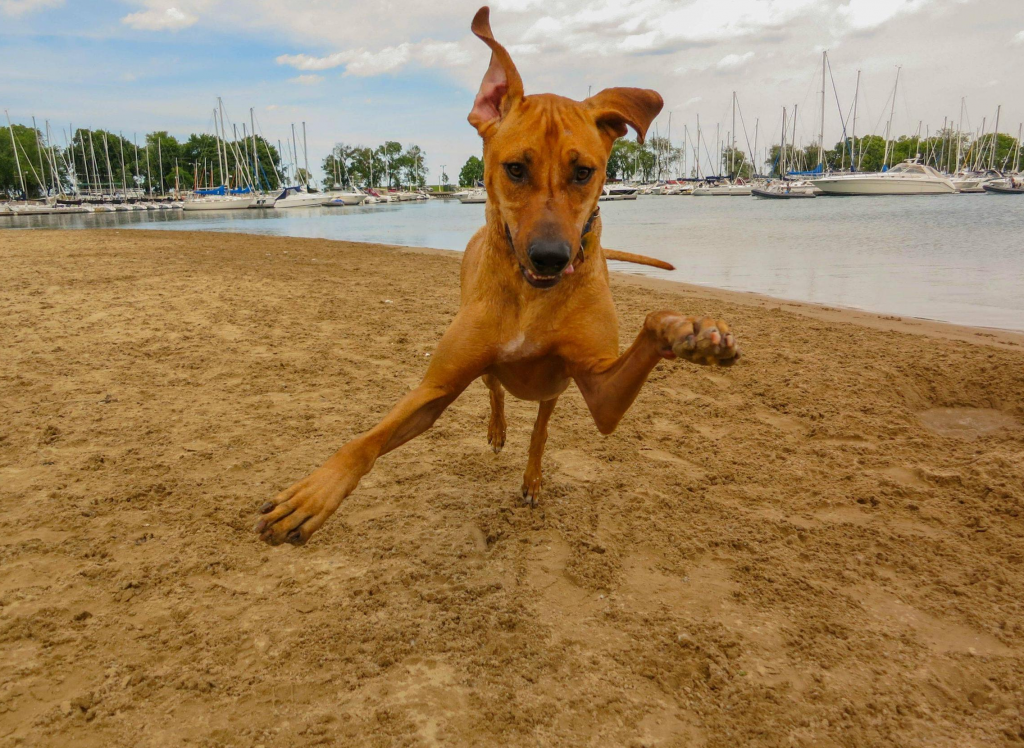
- You should always keep them on the leash as they have a very high wanderlust streak. They will run past the road without paying attention to cars.
- They’re the world’s hungriest dogs. Their stomach is a bottomless pit when it comes to food.
- They are cat lovers.
- They love to chase! They have a high prey drive that makes them run after everything interesting they see.
This was all about Rhodesian Ridgeback.
Let us know about your thoughts in our comment section!
Stay with us to know more about dogs and dog breeds.



